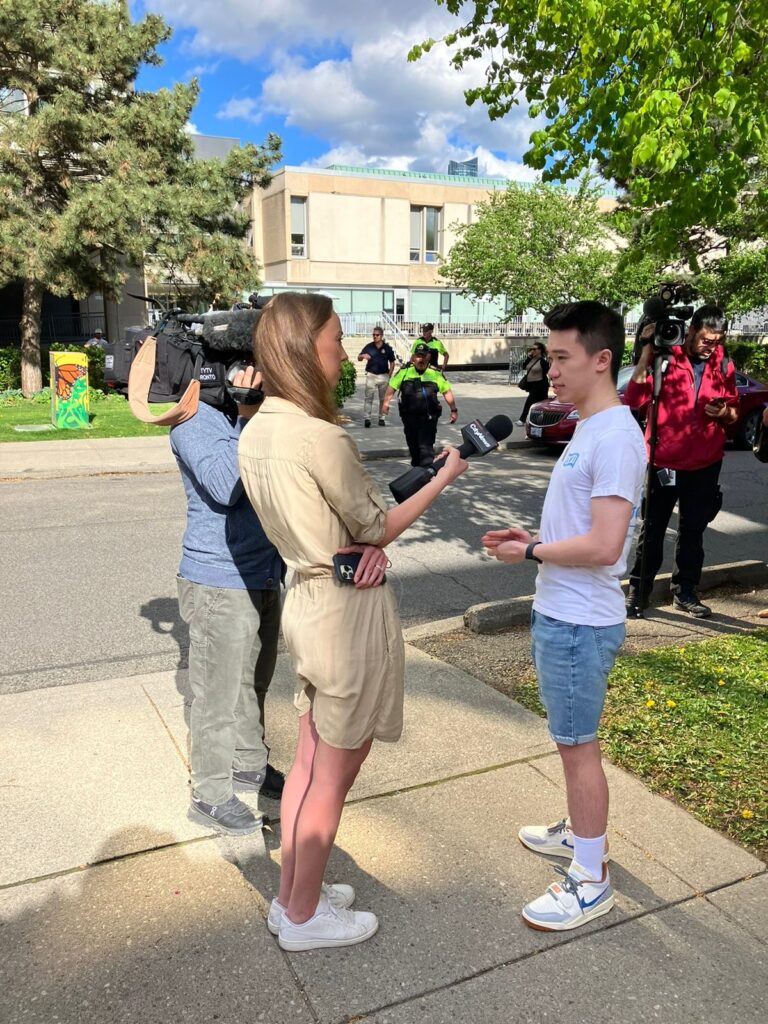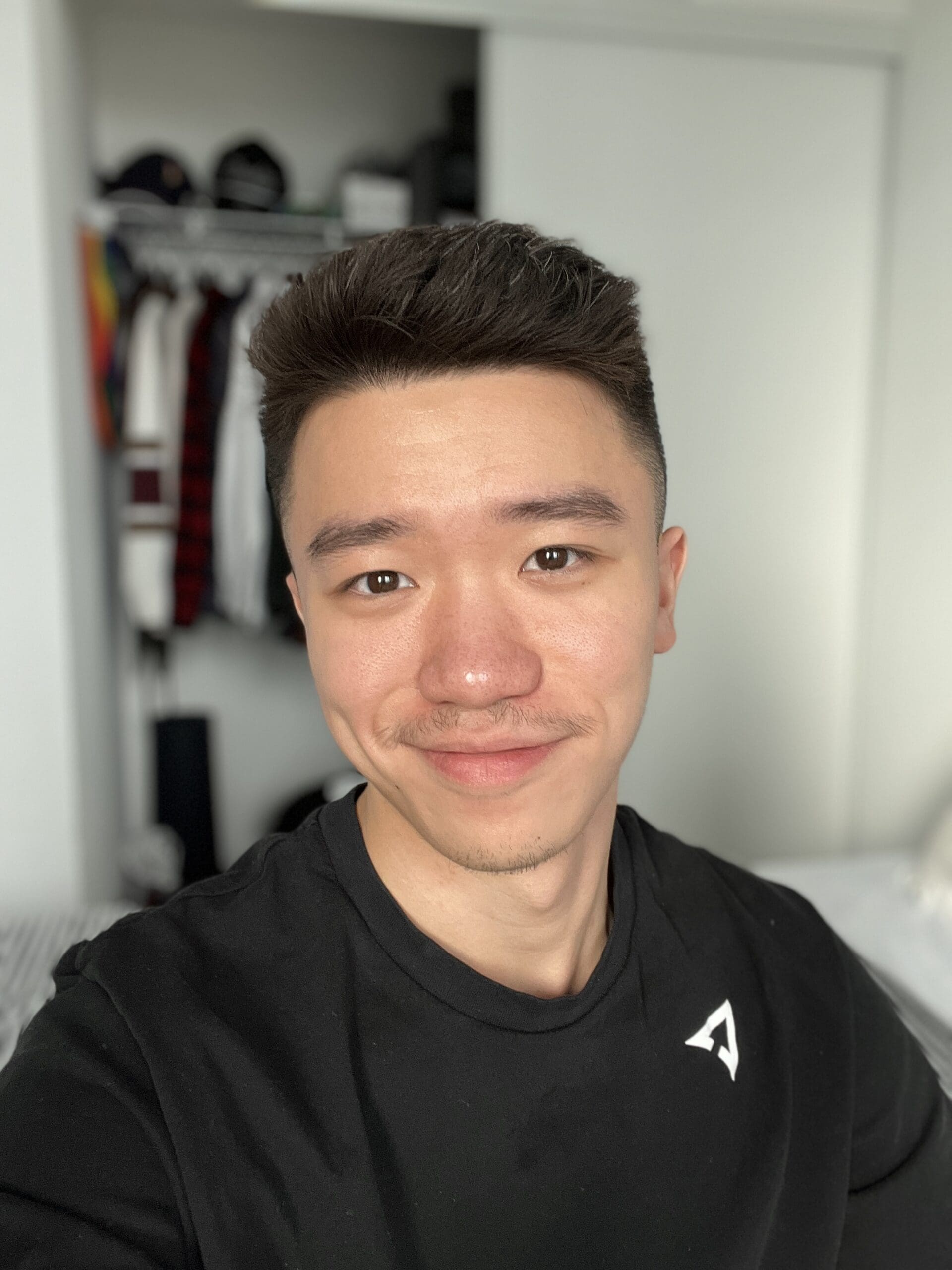After we caught Justin Chow‘s brave and poignant speech at a peace rally organized by @standwithuscanada @alliedvoicesforisrael @uaa.to @aepitoronto @hillelontario and the U of T Jewish Medical Students Association, we knew we had to interview him. In his own words, the core of his message was this: “We ALL need to pay close attention to this insidious global movement of Jew hatred, anti-Western rhetoric, and religious extremism propagated by terrorist groups like Hamas, and now, our students. If we let the encampments, the chanting of murder slogans, the harassment, violence, and intimidation continue on our campuses, very soon, we will reach a point of no return where history repeats itself in the worst possible way. … We NEED to come together and work as one united, human race. That is where we can find freedom. That is how we can be liberated.” Read our Q&A with Justin, below. —Vita Daily
What inspired you to speak out in solidarity with Jews and Israel at the peace rally?
I was originally planning on attending the rally anyways, but I was unexpectedly invited by one of the organizers to give a speech. So, with the opportunity that was presented to me, I decided to take advantage of it as much as possible, because I know that during this tumultuous time, being heard by many is a privilege that very few possess. As a non-Jewish ally, I knew that I carried a certain amount of privilege that allowed me to “oscillate between the realms” without enduring the same negative consequences that a Jewish student would’ve in my place. With this power that I held, I wanted to use it for good. To uplift people. To inspire people. To give people hope. To give the Jewish community an example of what it means to have someone “outside” care about you and fight for you.
Can you elaborate on why you believe it’s crucial for everyone to pay attention to issues like Jew hatred and religious extremism?
Open a history book and you’ll find time and time again that when strong emotions like hatred, anger, and resentment spiral out of control on a collective level, a variation of a slaughter-mob starts to emerge. The Crusades in Rhineland, the Spanish Inquisition, the Kishinev and Odessa pogroms in the Russian Empire, the Holocaust, I can go on and on and on… My point is that when there is mass hatred and unchecked resentment on such a scale, the damage that can be done is almost unfathomable because of the sheer power in numbers.
When that slaughter mentality is geographically isolated, the damage that it deals is still substantial, but there exists the possibility of recuperation and repair when all is said and done. Nowadays however, with the global presence and seemingly ubiquitous power of antisemitism dominating the Western world, we are seeing that same old hatred transcending borders using the Internet, with the Islamic regime spreading hateful and blatantly false claims about Jews and Israel. These claims, such as “genocide”, “apartheid”, “settler-colonialism” plays into the moral panic and mania that dominates much of leftist politics, taking advantage of this cancel-or-be-cancelled attitude, and using it against the most vulnerable and persecuted population in the history of humanity—Jews.
Paying attention to these patterns doesn’t mean you have to be a historian or know every single detail about Middle Eastern geopolitics, it merely is a message of caution. “Paying attention” cautions against making snap judgements, taking everything at face value, or believing everything you see to be the truth. Instead, pause and consider, stay curious, and don’t confuse your perception with reality.
How do you think the campus environment can be improved to foster more unity and understanding among diverse groups?
There must be a line that is clearly drawn in the sand. The university needs to establish a firm boundary against extremism and strictly enforce it. By excusing genocidal language and protest slogans that incite violence against Jews as the inevitable manifestations of free speech, the university has basically shown the perpetrators that there will be no consequences to their harmful actions. This is why the encampment remains. This is why the student representatives reiterate that they will not leave until the university meets all their demands. They are winning because our institutions are letting them win. In other words, the people who should be putting their foot down against non-negotiable violations of university conduct are doing a horrible job of protecting not just our students, but the very values that the university stands for.

Have you faced any challenges or backlash for your stance on this issue? If so, how have you addressed them?
Absolutely. Since October 7th, I have lost so many friends both online and in real life. I have been verbally harassed for publicly stating my views on the situation and expressing support for the Jewish community. I have been accused of being a racist, genocide-supporting Zionist who should be ashamed of myself. These were the more overt challenges that emerged, but throughout the school year, I felt this omnipresent tension and anxiety whenever I had to go to campus for class. Seeing keffiyehs being flaunted and proudly worn by my peers made me die a little bit inside, to be honest.
But I found my way to manage these challenges. I immersed myself in advocacy work alongside the Jewish students and communities that I had befriended, channeling that tension and anxiety into something productive and actionable. For the more covert forms of hate, I’ve found that it’s necessary to just ignore them, see them as background noise. Focus on the good things, the good people, the good environments. The countless friends that I’ve lost? No big deal! I’ll find others who have the same values as me.
In your speech, you mentioned the danger of history repeating itself. How do you think we can prevent such tragedies from happening again?
Our institutions need to make things like Holocaust AND antisemitism education mandatory and universal. It is precisely because people are uneducated and ignorant that they are easily influenced and manipulated by propaganda, social media, and misinformation spread by bad actors. There needs to be a serious re-evaluation of our current education system and how it is being infiltrated by radical, Marxist, left-wing extremist values that an entire generation has now internalized. We need to proactively stop the problem at its root instead of waiting for things to spiral out of control (i.e. October 7th).
What specific actions do you hope to see from university administrations and student organizations to promote peace and harmony on campuses?
University administrators: Enforce your policies against hate speech and incitement with the highest degree of strictness. Don’t assume that everyone is a rational agent making rational decisions, there are plenty of reckless and apathetic people who are already taking advantage of that naïve presumption. Once the ground rules are set, help facilitate dialogue between different views and groups. Remove the radicals who keep screaming, and let the majority have a respectful and civilized conversation.
Student organizations (e.g. UTSU): Taking a biased political stance when you say that you represent the voices of all students is gaslighting and avoiding responsibility. Make it mandatory for there to be a diverse spectrum of opinions in the union. Have a zero tolerance policy on hateful language and actions, or for representatives who hold problematic views that are ultimately harmful to the student body. Invest in promoting the importance of voting, and proactively educate students on how their experiences can be affected by student government and what they can do to advocate for themselves.
As an Asian queer student, do you think there are unique perspectives or experiences that you bring to discussions about social justice and human rights?
I do. Coming from a place where social justice and fighting for democracy has become a hopeless cause, I personally know and have witnessed the consequences of letting extremist ideas and groups win. A democratic society is a system of possibilities and fairness, albeit with its imperfections. However, because of its tolerance for a wide range of beliefs, attitudes, and perspectives, it is also always vulnerable to being manipulated and taken advantage of by one person’s greed. When that greed spreads and infects the collective, particularly through illogical yet extremely persuasive ideas, that’s when catastrophes happen.
Social justice isn’t just about promoting equality, it’s also about ensuring that radicalism and extremism are contained, policed, punished, and eliminated. Pretty much like how you would contain a virus.
What advice would you give to other students who want to speak out on contentious issues but may be hesitant to do so?
I understand why you would hesitate, and I understand that you may not even know what the hell is going on in the first place. That’s why you need to care. We need people like you, the Jewish community needs people like us who know barely anything about Jewishness or Israel but still stand for basic human values of decency, respect, acceptance, and love. It makes sense to be scared, our campuses seem like such threatening spaces right now where people are shouting and taking over a place that belongs to us. But you know what? You’re not alone in being scared. We’re all scared alongside you, and when we get together and unite as one loving collective, things just seem less scary. That’s the way humans work.
Be careful with the information and “facts” that people try to convince you to believe, especially if it’s being aggressively presented. Falsehoods conceal, whereas truth reveals. Truths don’t have to be loud; their power lies in their inherent clarity and authenticity. If something is creating division and causing harm, approach with caution and awareness. If it creates connection and dialogue, lean in.

Be the first to comment